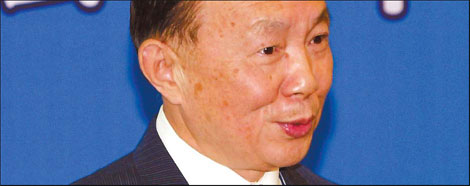
 |
|
Xu Dunxin is a senior diplomat and former Chinese ambassador to Japan.[Photo/China Daily] |
Tokyo's move of buying islands 'driven by domestic politics', former vice-minister says
Tokyo is using Washington's pivot to Asia as a chance to intensify the Diaoyu Islands issue to serve its own interests in a move that has harmed China-Japan ties, former vice-minister of foreign affairs Xu Dunxin has told China Daily in an exclusive interview.
"China-Japan relations will never be peaceful if the plot of 'purchasing' the Diaoyu Islands is not thwarted," the senior diplomat said on the 34th anniversary of the signing of 1978 China-Japan Treaty of Peace and Friendship.
Beijing and Tokyo normalized bilateral ties in 1972. Xu witnessed the negotiations that culminated in the signing of the historic 1978 treaty, which affirms in legal form the principles of the China-Japan Joint Statement of 1972.
A series of recent remarks and actions by Japan concerning China's Diaoyu Islands have escalated tensions between the two countries. Xu called for due attention to be paid to the relevant provisions of the treaty.
The joint statement and the treaty call on both sides to "settle all disputes by peaceful means and refrain from the use or threat of force".
Xu, also former Chinese ambassador to Japan, said that in the 1970s, the two countries reached an agreement to put aside the islands issue for the sake of the bigger picture of bilateral ties.
In 1978, following the signing of the treaty, former Chinese vice-premier Deng Xiaoping visited Japan. In response to media focus on the islands issue, Deng reiterated the consensus of shelving disputes, and he warned against any attempts to play up the islands issue to "obstruct the development of China-Japan relations".
Researchers and observers on both sides have referred to Japan's hot and cold attitude toward bilateral ties as the "pendulum effect".
Xu said the constant wavering shows Japan's "failure to keep its promises" made in the 1972 joint statement and the 1978 treaty.
Tokyo Governor Shintaro Ishihara, a right-wing activist, announced plans to buy the Diaoyu Islands in April.
Ishihara's outspoken "purchasing plan" and his recent application to land on the islands for a so-called land survey, are just games meant to distract from his true intentions, said Xu. The moves are aimed at "breaching China-Japan ties and bringing an impact to the ruling Democratic Party of Japan", he said.
In early July, Japanese Prime Minister Yoshihiko Noda announced plans to "nationalize" the Diaoyu Islands, prompting China to lodge solemn representation.
According to Xu, Japan's repeated claims are farcical and harm bilateral ties. He said Japan's actions are driven by domestic politics as well as the changing international situation.
"The farcical episodes are exploiting the domestic nationalist mood and Washington's pivot to Asia to take advantage while damaging China-Japan ties. It is very vicious to bluff their domestic public for support and to gain political capital," Xu said.
He warned that the moves of Ishihara and Noda are both "illegal and invalid", and do not change the fact that the Diaoyu Islands have been China's territory since ancient times.
Despite the latest turbulence, the senior diplomat placed high expectations on the momentum of bilateral exchanges in both economical and civil fields. The momentum "shows the will of people in both nations. Its power is considerable, and it is impossible to ruin bilateral ties with just a few tricks", he said.
"With ties developing over the past 40 years, China and Japan have been inseparable in the field of economy and trade. This year's bilateral trade volume is around 300 times of that 40 years ago," said Xu. "No one can afford to risk bilateral trade."
The two countries have become each other's major trade partner, and Xu said they are tightly connected because of the common issues they are facing, including the European debt crisis and slumping exports to Europe and North America.
"China and Japan are close neighbors. We all know that a country cannot choose its neighboring countries, and the only path ahead of both countries is to learn how to get along with each other," Xu said.